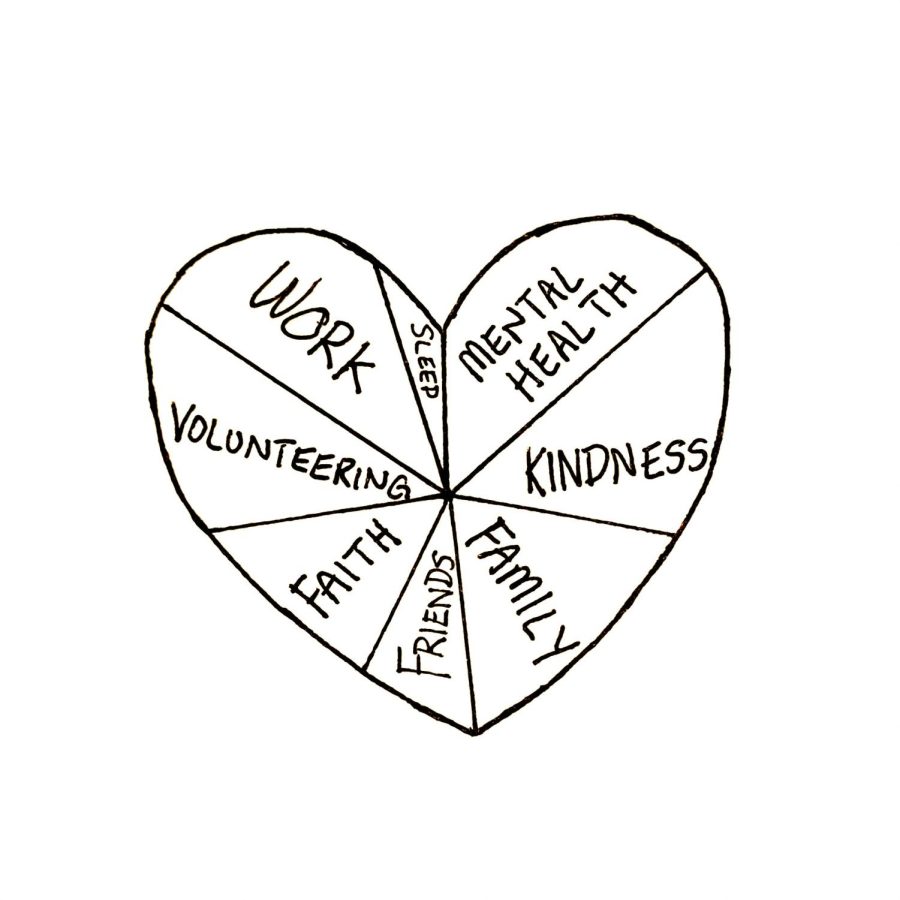What do people care about?
The heart is a resource which we use to build value and meaning. Art by the author
Apr 8, 2023
“I don’t care” functions as both a defense mechanism and an attack. If someone identifies a flaw, pokes a hole in an argument, the receiver on the other end can signal indifference with a simple “I don’t care.” I don’t care about your commentary and, for that reason, I’m safe from the pain you may or may not be trying to inflict by saying you don’t care. Similarly, if someone lays out something meaningful, a story, presentation, secret, anything, “I don’t care” turns into a declaration of apathy and it cuts like a knife.
Recently, I’ve been fascinated by what matters to people. Whether a certain amount of overlap suggests that some things carry universal meaning is irrelevant to this column. I align myself with the process of care, of importance, of assigning value. What people care about anticipates their ambitions as well as their fears, their ethics and their evils. My goal is to locate a capacity for care in each individual and perhaps to argue for care as a natural law, and to consider the human capacity for care as the origin point for emotion and action.
In my own conversations and reflection, I’ve found it immensely difficult to pin down a couple abstractions to which I remain steadfast. Life seems more complex to me than pledging allegiance to authenticity, honesty, happiness, balance, wisdom, beauty, courage, family, acceptance, endurance, individuality. As a result, I find myself clutching at straws trying to conceptualize how value becomes action and action becomes meaning. I struggle even more so when I try to articulate it.
There’s merit to identifying a value and living in accordance with it. The honest person finds a liar to be the most evil; the loyal friend considers betrayal the cardinal sin; the humble man takes most issue with arrogance. In a way, living in accordance with a chosen value is charmingly simple. When at an impasse, consult your values. What would a kind person do in this scenario? How would a brave soul handle the situation? What would someone who values authenticity above all respond to a proclamation of “I don’t care”?
But values are never really chosen (though actions that correspond with them are) and I don’t imagine that people ask themselves questions like the ones listed above in their daily lives. Values are identified at some point as existing internally and having been found as opposed to having been manufactured by the person. In other words, the values seem to reveal themselves to us rather than us installing them in ourselves. When one identifies oneself as intelligent and of valuing wisdom, one is quick to take credit for one’s own intelligence, to deny the question of whether the value was arbitrarily assigned or not. If we consider ourselves authentic, we’ve also gone a long way to convince ourselves that we are authentic by design and not by chance, that we’ve earned it.
We tend to take ownership of our values, often erroneously. To say I am humble because I willed it so, for example, feels wrong to me. To say I am compassionate by my actions rather than by nature and that my continual practice of compassion is my own doing feels dishonest. We often claim ownership and cling ferociously to values we can only ever partially grasp.
I included this bit on values because what we care about stems mostly from these values. Values need to be part of the conversation, as I see them as the parents of individual cares.
What is worth caring about? Heath — stems from the values of self-care, longevity, happiness, wellness. It looks like working out, eating well, establishing boundaries, putting yourself first. God — stems from the value of faith, community, family, trust, sacrifice. It looks like prayer, reflection, going to church, volunteering or doing charity work, faith communities, living as He intended we live. Greatness — stems from the values of self-improvement, confidence, perseverance, succeeding under pressure. It looks like giving up sleep, obsessing over that which you deem worthy, single-mindedly chasing goals down. Helping others — stems from the values of compassion, empathy, justice. It looks like advocacy, both visible and invisible, being an ear and a voice.
A wild card: Work – stems from values of money, professional success, growth of power and influence. It looks like late nights, saying no to plans, dedicating every waking moment to building your resume, network, or business. It’s a perfectly valid care, but it comes at the cost of one’s soul. It’s a care that eats all others.
While this list is incomplete, I mean for it only to draw a line between abstractions and reality. What one values and what one cares about are largely interchangeable, as demonstrated above, though the question of whether value precedes care or care precedes value remains unclear to me. I would argue that, before we can care about God, justice, freedom, a significant other, we must first be able to care in general.
Though I have no peer-reviewed study behind me, it feels like care is the mother value from which all other values spring. To value anything implies care; it requires care. Why, then, does apathy prevail? The shortest answer is that it prevails as an opposite: apathy exists so that we might see the existence and importance of caring. Apathy wouldn’t exist if there weren’t people who cared and things they cared about.
The more I think about it, however, apathy doesn’t stand the test. Apathy must care about something; the absence of care simply doesn’t make sense. For something to function, it must come with care. Here, then, is what apathy cares about: to the apathetic (or the nihilist if you prefer), the idea that matters most is that little to nothing matters, and therefore that there is little to nothing to care about. The notion that nothing matters very much matters very much.
Reading it all over, I might say that I care most about care, I value value. But that sounds so pretentious. I care about the opinions of others, about being the person I say I am, about my friends and family, about baseball scores and trades, about what it means to be a writer, about who’s mad at me and why, about being a good student, about where I stand as a representative of the species. Above it, though, I care about keeping my list of cares long, lest I run out and the most important thing to me becomes maintaining the absence of importance.














Eric Fogle • Apr 10, 2023 at 11:52 pm
Brilliant